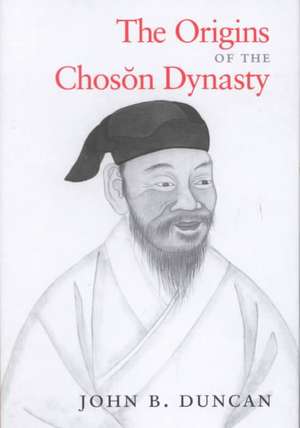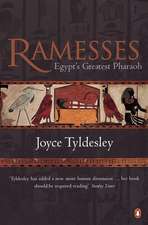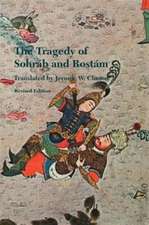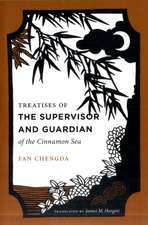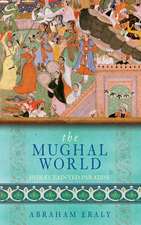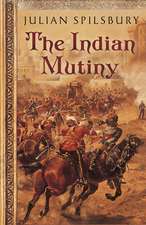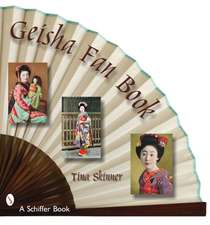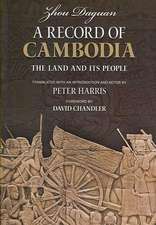The Origins of the Choson Dynasty: Korean Studies of the Henry M. Jackson School of International Studies
Autor John B. Duncanen Limba Engleză Hardback – 30 sep 2000
| Toate formatele și edițiile | Preț | Express |
|---|---|---|
| Paperback (1) | 270.54 lei 6-8 săpt. | |
| MV – University of Washington Press – 30 apr 2014 | 270.54 lei 6-8 săpt. | |
| Hardback (1) | 653.33 lei 6-8 săpt. | |
| MV – University of Washington Press – 30 sep 2000 | 653.33 lei 6-8 săpt. |
Preț: 653.33 lei
Preț vechi: 848.48 lei
-23% Nou
Puncte Express: 980
Preț estimativ în valută:
125.03€ • 129.79$ • 104.25£
125.03€ • 129.79$ • 104.25£
Carte tipărită la comandă
Livrare economică 22 martie-05 aprilie
Preluare comenzi: 021 569.72.76
Specificații
ISBN-13: 9780295979854
ISBN-10: 0295979852
Pagini: 400
Ilustrații: 26 tables, 10 charts
Dimensiuni: 167 x 234 x 33 mm
Greutate: 0.74 kg
Ediția:New.
Editura: MV – University of Washington Press
Seria Korean Studies of the Henry M. Jackson School of International Studies
ISBN-10: 0295979852
Pagini: 400
Ilustrații: 26 tables, 10 charts
Dimensiuni: 167 x 234 x 33 mm
Greutate: 0.74 kg
Ediția:New.
Editura: MV – University of Washington Press
Seria Korean Studies of the Henry M. Jackson School of International Studies
Recenzii
Duncan has assembled the fullest evidence to date. --Martina Deuchler, University of LondonA landmark study . . . an original and mature work of research.--James B. Palais, University of Washington
Cuprins
List of Tables
List of Genealogical Charts
Acknowledgments
Introduction
1. The Koryo Political System
2. The Rise of a Central Bureaucratic Aristocracy
3. The Yangban in the Change of Dynasties
4. Institutional Crisis in the Late Koryo
5. Reform and Dynastic Change
6. The Ideology of Reform
7. Some Final Considerations
Notes
Korean Dynasties and Kings
Glossary of Korean, Chinese, and Japanese Terms
Bibliography
Index
Tables
1.1 Concurrent Appointments, 981¿1069 and 1070¿1146
2.1 Descent Structure of the Central Bureaucracy, 981¿1146
2.2 Most Powerful Descent Groups, 981¿1146
2.3 Descent Groups with Multiple Sons in Office, 1070¿1146
2.4 Comparison of Descent Groups, 981¿1069 and 1070¿1146
2.5 Descent Structure of the Central Bureaucracy, 1260¿1392
2.6 Most Powerful Descent Groups of the Late Koryo
2.7 Examination-Graduate Officials, 1260¿1392
3.1 Grade Structure at the Beginning of the Choson
3.2 Distribution of Officials by Branch and Grade, 1392¿1400
3.3 Descent Structure of the Central Bureaucracy, 1392¿1400
3.4 Most Powerful Descent Groups under T¿aejo and Chongjong
3.5 Descent Structure of the Central Bureaucracy, 1401¿5
3.6 Most Powerful Descent Groups under T¿aejong, 1401¿5
3.7 Most Powerful Descent Groups, 1392¿1405
3.8 Status of Powerful Choson Descent Groups in the Late Koryo
3.9 Descent Groups New to the Central Bureaucracy, Late KoryöEarly Choson
3.10 Status of Fallen Late Koryo Great Descent Groups
3.11 Intermarriage among the Top Ten Descent Groups, Late Thirteenth and Fourteenth Centuries
3.12 Descent Structure of the Central Bureaucracy, 1430¿32
3.13 Descent Structure of the Central Bureaucracy, 1455¿57
3.14 Most Powerful Descent Groups, 1430¿32 and 1455¿57
3.15 Descent Groups with the Most Examination Graduates, 1392¿1592
4.1 Levels of Todang Activity, 1279¿1351
4.2 Levels of Todang Activity, 1351¿88
5.1 Consolidated Army Command Officials, 1393¿98
Tables
Genealogical Charts
Hwangnyo Min
Andong Kwon
P¿ap¿yong Yun
Munhwa Yu
Andong Kim
Chuksan Pak
Kyongju Yi
P¿yongyang Cho
Ch¿ongju Han
Chonju Ch¿oe
List of Genealogical Charts
Acknowledgments
Introduction
1. The Koryo Political System
2. The Rise of a Central Bureaucratic Aristocracy
3. The Yangban in the Change of Dynasties
4. Institutional Crisis in the Late Koryo
5. Reform and Dynastic Change
6. The Ideology of Reform
7. Some Final Considerations
Notes
Korean Dynasties and Kings
Glossary of Korean, Chinese, and Japanese Terms
Bibliography
Index
Tables
1.1 Concurrent Appointments, 981¿1069 and 1070¿1146
2.1 Descent Structure of the Central Bureaucracy, 981¿1146
2.2 Most Powerful Descent Groups, 981¿1146
2.3 Descent Groups with Multiple Sons in Office, 1070¿1146
2.4 Comparison of Descent Groups, 981¿1069 and 1070¿1146
2.5 Descent Structure of the Central Bureaucracy, 1260¿1392
2.6 Most Powerful Descent Groups of the Late Koryo
2.7 Examination-Graduate Officials, 1260¿1392
3.1 Grade Structure at the Beginning of the Choson
3.2 Distribution of Officials by Branch and Grade, 1392¿1400
3.3 Descent Structure of the Central Bureaucracy, 1392¿1400
3.4 Most Powerful Descent Groups under T¿aejo and Chongjong
3.5 Descent Structure of the Central Bureaucracy, 1401¿5
3.6 Most Powerful Descent Groups under T¿aejong, 1401¿5
3.7 Most Powerful Descent Groups, 1392¿1405
3.8 Status of Powerful Choson Descent Groups in the Late Koryo
3.9 Descent Groups New to the Central Bureaucracy, Late KoryöEarly Choson
3.10 Status of Fallen Late Koryo Great Descent Groups
3.11 Intermarriage among the Top Ten Descent Groups, Late Thirteenth and Fourteenth Centuries
3.12 Descent Structure of the Central Bureaucracy, 1430¿32
3.13 Descent Structure of the Central Bureaucracy, 1455¿57
3.14 Most Powerful Descent Groups, 1430¿32 and 1455¿57
3.15 Descent Groups with the Most Examination Graduates, 1392¿1592
4.1 Levels of Todang Activity, 1279¿1351
4.2 Levels of Todang Activity, 1351¿88
5.1 Consolidated Army Command Officials, 1393¿98
Tables
Genealogical Charts
Hwangnyo Min
Andong Kwon
P¿ap¿yong Yun
Munhwa Yu
Andong Kim
Chuksan Pak
Kyongju Yi
P¿yongyang Cho
Ch¿ongju Han
Chonju Ch¿oe
Notă biografică
Descriere
A landmark study offering a new interpretation of the history of traditional Korea
